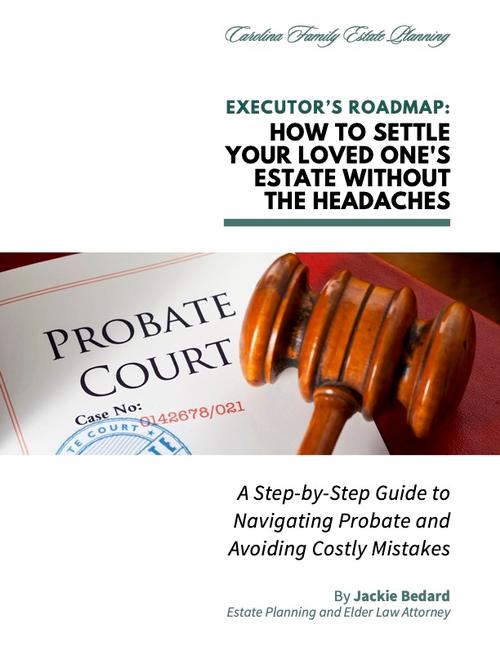Our North Carolina Probate and Estate Administration Attorneys Can Help You Settle Your Loved One's Estate
Losing a loved one is hard. The days and weeks after a loss are often fraught with grief, questions, and, unfortunately, family complications. It’s a terrible time to try to think through a legal process clearly. While the North Carolina General Statutes are the guiding law about what happens to an estate upon the death of a North Carolina resident, they are not exactly casual reading material. The law is made to address the variety of unique situations that may come up. It can be confusing, and long-winded, and it might even seem like it’s written in another language.
Whether you have just lost a spouse or a parent, you believe you may be entitled to a part of an estate, or you’ve just received a letter from the court, you could probably use some guidance. The experienced North Carolina probate and trust administration attorneys at Carolina Family Estate Planning are here to help.
What Is Probate? What Is Estate Administration?
These terms often are used interchangeably. Technically, probate is the court process of proving the validity of and then overseeing that the instructions provided in the will are followed properly and the estate is correctly administered. When there is no will, the process is simply referred to as estate administration. You are probably most familiar with the daunting term “going through probate” being used whether or not there is a will.
The tasks to be completed during the probate process can vary depending upon the circumstances, but generally, they involve:
- Filing a petition with the probate court
- Providing proper notice to the heirs named under the will (or by statute if the deceased died without a will)
- Petitioning the probate court to be appointed as executor or administrator
- Publishing a legal notice in the local newspaper to notify any creditors of the deceased
- Filing an inventory of the assets of the estate
- Paying legitimate debts of the estate
- Filing and payment of estate taxes, if applicable
- If needed, sale of some or all estate assets
- Final accounting to the court and distribution of remaining assets to the heirs
How Our Attorneys Make the Probate, Estate Administration, and Trust Administration Process Easier
 The probate and estate administration lawyers at Carolina Family Estate Planning are here to make the process easier. We help our clients by taking on the detailed, challenging work of estate administration so that you can focus on your own life and family, with the peace of mind of knowing that you are respecting your loved one’s wishes.
The probate and estate administration lawyers at Carolina Family Estate Planning are here to make the process easier. We help our clients by taking on the detailed, challenging work of estate administration so that you can focus on your own life and family, with the peace of mind of knowing that you are respecting your loved one’s wishes.
When you call our office, the first person you’ll talk to is a Client Welcome Specialist. They will ask you what made you decide to call our office and some follow-up questions, and then they will work with you to identify the best next step to help you move forward.
If we believe we can help you with legal services, our Welcome Specialist will go through a free case assessment by phone and then schedule a meeting with our Estate Administration/Probate team. During that call, we will dig a little deeper and talk about your loved one's assets, and hear your concerns. Using this analysis, we will either discuss an estate administration action plan or provide you with alternative guidance about what your next step should be.
We strive to make working with Carolina Family Estate Planning a remarkably enjoyable experience. We will prepare all the paperwork you need to work with the court, beneficiaries, and Co-Executors. At the end of every meeting, we will ask to make sure we’ve answered all of your questions. We will reliably follow up on any open issues. And throughout the administration process, we will provide you with regular updates about your case.
We want you to feel confident that you are in control of the process and that everything is done right, as the law requires. Most importantly, to every extent possible, our probate team wants to help you carry out your loved one’s wishes.





